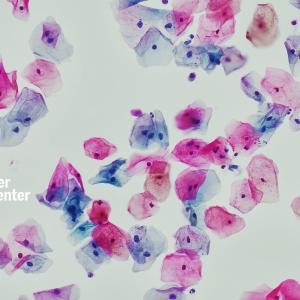Cervical Cancer Awareness Month Spotlights a Hard-to-Detect Disease

Photo: rightdx/Getty
When 29-year-old Nyemma arrived for a free pap test at the Family Health Centers at NYU Langone in Brooklyn earlier this month, she expected another routine visit. For the past several years, she had been diligent about receiving annual cancer screenings, which had always come back clear. On this frigid January day, however, Nyemma was startled to learn the doctors had identified precancerous cells in her cervix.
Hearing this news, Nyemma, who works as a paraprofessional in a Brooklyn middle school, wondered if she would need to schedule more visits and procedures, if insurance would cover the costs, and if she was facing a serious health risk. Her concerns were quickly eased because the next step took place right then, in the doctor’s office. She had a complete removal of her abnormal cells, with no additional costs or procedural arrangements.
Same-Day Cancer Screening and Preventive Treatment in the Clinic
Cervical cancer screening technology recently introduced at the Women’s Health—Family Health Centers at NYU Langone in Sunset Park, Brooklyn, enables physicians to detect and remove precancerous cells from the surface or canal of the cervix during the patient’s same appointment. The loop electrosurgical excision procedure, known as LEEP, is typically performed with local anesthesia and is similar to a colon cancer screening in which physicians remove any developing polyps in real time during a colonoscopy. This ease of access to state-of-the-art treatment can help many women in low-income communities stay healthy, while avoiding time-consuming and costly interventions that seem out of reach.
“They asked me, would you like to take care of this right now in the office,” says Nyemma describing her screening visit. “I said, of course! It was so easy.” Nyemma no longer has any abnormal precancer cells of her cervix, significantly reducing her risk of developing cervical cancer.
Although Nyemma, a Brooklyn College–bound millennial, regularly received annual pap tests, clinicians at the Family Health Centers at NYU Langone say many patients are reticent to participate in screenings, especially older women who may not be aware of cervical cancer risks or those who are worried about insurance and documentation.
“The LEEP option is local and free of charge, encouraging women to take that first step and come in for a screening,” says Meleen Chuang, MD, medical director of women’s health at the Family Health Centers at NYU Langone. “And because LEEP can treat high-grade precancer lesions in the office, it’s especially helpful for women who find it hard to get away from jobs or family to take care of their own health,” explains Dr. Chuang.
Dr. Chuang says her patients are extremely grateful for this treatment option, “One patient even tried to give me cash, through tears, after her procedure.”
About Cervical Cancer
The American Cancer Society estimates there were 14,480 new cases of cervical cancer in the United States in 2021, and 4,280 women died from this disease that shows no signs or symptom in its early states. Cervical cancer’s stealthy profile makes screenings especially vital.
Death rates remain higher for minority women, in particular, and access to care is a factor, several studies from the National Institutes of Health have shown. From 2014 to 2017, Hispanic women accounted for the largest percentage of cases, 9.5 for every 100,000 women. Non-Hispanic Black women had the highest death rate of 2.5 per 100,000 women, according to the American Cancer Society.
Along with screenings, vaccines are making a difference in reducing cervical cancer rates. The Family Health Centers at NYU Langone also offer low-cost access to the human papillomavirus (HPV) vaccine, which guards against cervical cancer. A series of three vaccines over six months can cost hundreds of dollars elsewhere, Dr. Chuang explains, deterring patients from receiving this important prevention strategy. That same series is only $30 for eligible patients at the Family Health Centers at NYU Langone.
Media Inquiries
Joan Lebow
Phone: 201-207-6261
joan.lebow@nyulangone.org

